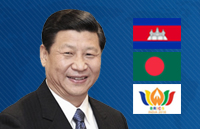China's new IMF deputy settles into job
Zhang Tao, deputy managing director of the International Monetary Fund (IMF), attended his first IMF/World Bank annual meeting in his new capacity after assuming office on Aug 22, replacing Zhu Min, also a Chinese national.
He was busy during the annual meetings. Just in the meeting room of his office, he has met several dozens of visiting ministers and central bank governors during the last few days.
As the world's second-largest economy, China has been a major engine for the global economy both before and after the 2008 financial crisis.
"Looking into the future, emerging markets and developing countries will continue to contribute to a great share of global growth," Zhang told the press on Sunday evening. He added that such a trend has lasted for quite a while.
According to Zhang, IMF has forecast global growth to slow to 3.1 percent in 2016, compared with its forecast of 3.2 percent in April. He described the growth as at a low level compared with the 10 to 15 years before the financial crisis.
While the forecast for 2017 is 3.4 percent, better than that for 2016, it is still lower than the forecast of 3.5 percent in April.
Zhang described the growth in Europe as flat, while the forecast for the US has been marked down by 0.6 percentage point, an adjustment he said has not surprised the market.
He believes that Brexit and some issues debated during the 2016 US presidential election have discouraged investors, while many developed countries also face declining productivity and aging populations.
Zhang, a former vice-governor of the People's Bank of China, described the debate in some developed countries about income inequality and its relationship with globalization as going beyond the economics.
Zhang, IMF's executive director for China from 2011 to 2015, said the growth forecast for emerging markets and developing countries also was not as high as in previous years.
Zhang's words largely echoed the latest 2006 World Economic Outlook report released last week.
According to the report, financial market sentiment toward emerging market economies has improved with expectations of lower interest rates in advanced economies, reduced concern about China's near-term prospects following policy support to growth, and some firming of commodity prices.
But prospects differ sharply across countries and regions, with emerging Asia in general and India in particular showing robust growth and sub-Saharan Africa experiencing a sharp slowdown. In advanced economies, a subdued outlook subject to sizable uncertainty and downside risks may fuel further political discontent, with anti-integration policy platforms gaining more traction, according to the report.
chenweihua@chinadailyusa.com























